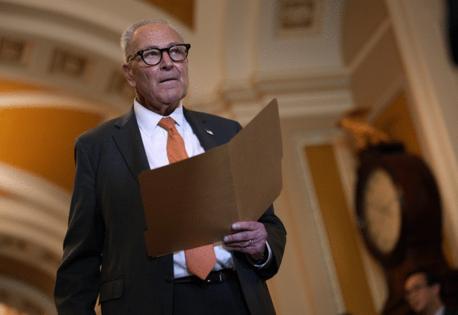Matthew Yglesias: Shut down the government to save health care
Published in Op Eds
A lot of Democratic voters are looking for a fight, and a lot of Democratic politicians are looking to accommodate them. As it happens, the legislative calendar can oblige both sides: Democrats should be willing to risk a government shutdown, which looms at the end of the month, in order to save health insurance subsidies for millions of Americans, which are set to expire at the end of the year.
A worthwhile fight is one that is well-chosen to achieve something substantively and politically. That means picking a fight on Democrats’ best issue, health care, at a time when Americans are crying out for action on the cost of living. If Senate Majority Leader Chuck Schumer doesn’t jump into this battle early, the situation could quickly careen out of his control, the way it nearly did the last time around.
An appropriations bill needs 60 votes to pass the Senate. In last spring’s debate over the appropriations bill, Democrats calculated that House Republicans — with their narrow majority — would be unable to pass a spending bill on a party-line vote. It was not an unreasonable assumption: In recent years, there has been a substantial clutch of right-wing House members opposed to any bill that doesn’t include dramatic spending cuts. It is offset by another clutch of frontline House Republicans who don’t want to vote for dramatic spending cuts, especially since party-line bills can’t pass the Senate anyway. Democrats assumed this same dynamic would stymie House Republicans and create an opportunity for Senate Democrats to craft a bipartisan budget bill.
They were wrong. Republican leaders were able to convince their right-wing caucus to vote for a more or less “clean” bill. When that was done, Senate Republicans lined up behind it and dared Democrats to filibuster, which would have induced a government shutdown. Schumer faced overwhelming pressure — from his caucus, from donors, and from Democratic activists — to allow a shutdown and demand concessions on DOGE cuts. He and a handful of loyalists wisely recognized that a shutdown on that basis would only make it easier for Trump to dismantle the federal government, and they voted to pass the Republican bill.
It was the correct call, but a costly one: It was disappointing, to put it mildly, to a party base that was already very angry.
Unfortunately, it is simply not possible for a minority of 47 senators to force an end to the whole list of things that President Donald Trump is doing which enrage rank-and-file Democrats. The only way to genuinely address Democrats’ concerns is to try to win control of both houses of Congress next year, which would allow Senate Democrats to block or stall the ongoing MAGAfication of the judiciary, and then to win the presidency in 2028.
If Schumer lets the debate over the current appropriations bill become a free-floating forum for grievances and demands, then he could find himself in the position of threatening a shutdown fight over a huge set of unrelated issues. And if he tries to duck the debate altogether, furious activists will lean on safe-seat senators to “fight” — and Democrats will have a rerun of last spring’s ugly intra-party split.
The solution is to pick a winnable fight on a specific issue — ideally an issue that Democratic challengers in the midterms are comfortable with.
Health care is that issue. Former President Joe Biden increased the generosity of the subsidies available for families to buy insurance on the Affordable Care Act exchanges. That saves money directly for those families, but it also benefits people like me, who buy unsubsidized plans, because it expands the risk pool. The Kaiser Family Foundation calculates that if the subsidies lapse, out-of-pocket costs will rise by a staggering 75% for the average family. That’s awful enough that Republicans might actually give in and do what Democrats are asking for, allowing Schumer and the Democratic leadership to tell the base that not only did they fight Trump — they won.
Of course, Republicans might also stick to their guns and the government will shut down. What happens then is anyone’s guess, but at least Democrats would have a quick and easy explanation of what it is they are fighting for: not a total rollback of the Trump presidency, but a concrete win for Americans’ pocketbooks.
Democrats often bemoan the fact that even though their stances on basic kitchen-table issues poll well, they tend to get drowned out by spicier culture-war conflicts. A government shutdown over health care is a solution to that problem. It would be an opportunity to underline the kind of contrast that Democrats want, give the base the fight it craves, and offer party frontliners and Senate challengers in red states the kind of issue they are comfortable with.
But for it to work, Democrats need to start getting people excited now about a fight over health-care costs. Otherwise the void will inevitably be filled by demands to shut down the government over any one of dozens of various outrages Trump has perpetrated.
I am extremely sympathetic to the many complaints about the Trump administration. But the ultimate remedy for them will come at the ballot box, not through congressional gamesmanship. The role of gamesmanship is to highlight the political conflicts that are most likely to imperil Republican majorities. That argues for a nice clean fight over the expiring subsidies for health insurance — a vitally important issue that most voters have yet to hear about.
____
This column reflects the personal views of the author and does not necessarily reflect the opinion of the editorial board or Bloomberg LP and its owners.
Matthew Yglesias is a columnist for Bloomberg Opinion. A co-founder of and former columnist for Vox, he writes the Slow Boring blog and newsletter. He is author of “One Billion Americans.”
©2025 Bloomberg L.P. Visit bloomberg.com/opinion. Distributed by Tribune Content Agency, LLC.
























































Comments